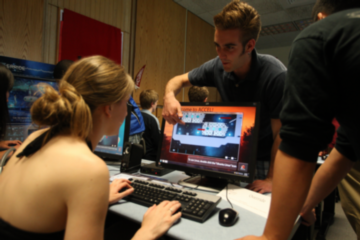GDIAC Courses
The core of the game design minor is a sequence of courses specifically dedicated to game design. These are project-oriented courses where students work in interdisciplinary teams of 4-6 to develop a game. At the close of the semester, the students present their projects at the GDIAC Showcase, which is open to the public. In addition, when licensing and technical issues permit, many of the games presented at the GDIAC Showcase are available for download from this site.
As these courses are interdisciplinary, students may join these from several different tracks. Each course has a dedicated track for programmers, user-interaction specialists, artists, and musicians. Sometimes game writers are also permitted to join these courses, though this is limited to only the most exceptionally talented students.
CS/INFO 3152: Introduction to Computer Game Development
This course introduces students to the basic design principles in computer game development. It also introduces software engineering concepts specific to game design, and is an overview of the primary engineering challenges in developing a game. Communication skills are important part of this design process, and so CS?INFO 3152 satisfies the College of Engineering's technical writing requirement.
This course is designed to be taken during the sophomore year, and is a prerequisite to both the next course in the sequence (CS/INFO 4152) and independent study. Students who demonstrate significant ability coming into Cornell may be permitted to take this course during their freshman year.
This course was formerly numbered CIS 3000, and some official material may still reference the course this way. The new numbering scheme was designed to give CS students elective credit for this course (previously the course was a general elective, but not a CS elective). Because of this redesign, the CS and INFO listings of the course are actually distinct courses, and only programmers are permitted to take the CS listing of the course. Designers and artists must take the INFO listing of this course.
CS/INFO 4152: Advanced Projects in Computer Game Development
This course is intended to be a Capstone experience in which students synthesize advanced topics from other courses into an advanced game project. The course is project-oriented and follows the same structure as CIS 3000, but allows students to explore games that are more experimental or ambitious in scope. Games in this course often involve custom 3D game engines, online multiplayer support, or mobile platform development.
This course is designed to taken during the senior year, and students are expected to take other coursework between this course and CIS 3152. In some cases, exceptionally talented juniors are welcome to take this class. In addition, the course is open to graduate students who are not permitted to take classes below the 4000 level.
This course was formerly numbered CIS 4002, and some official material may still reference the course this way. The new numbering scheme was designed to give CS students elective credit for this course (previously the course was a general elective, but not a CS elective), as well as to open the course to CS MEng students. Because of this redesign, the CS and INFO listings of the course are actually distinct courses, and only programmers are permitted to take the CS listing of the course. Designers and artists must take the INFO listing of this course.
CS/INFO 4154: Analytics-driven Game Design
This is a project-based course in which programmers and designers collaborate to design, implement, and release a video game online through popular game portals. Particular emphasis is placed on achieving real-world impact. Students will use the internet as a resource to gather data anonymously from players and analyze this data in order to improve their game over multiple iterations. Technical aspects of this course include programming and statistical analysis. Artistic aspects of this course include character animation, user-interface design, and environment design.In the Fall 2014 offering of this class, students created eight games that were collectively played by over 190,000 people. Some of the games made it to the front page of Kongregate and were featured by a very good game review website (JayIsGames). A version of this class taught at the University of Washington produced Hello Worlds, a popular puzzle game that has been played more than 1.5 million times.

